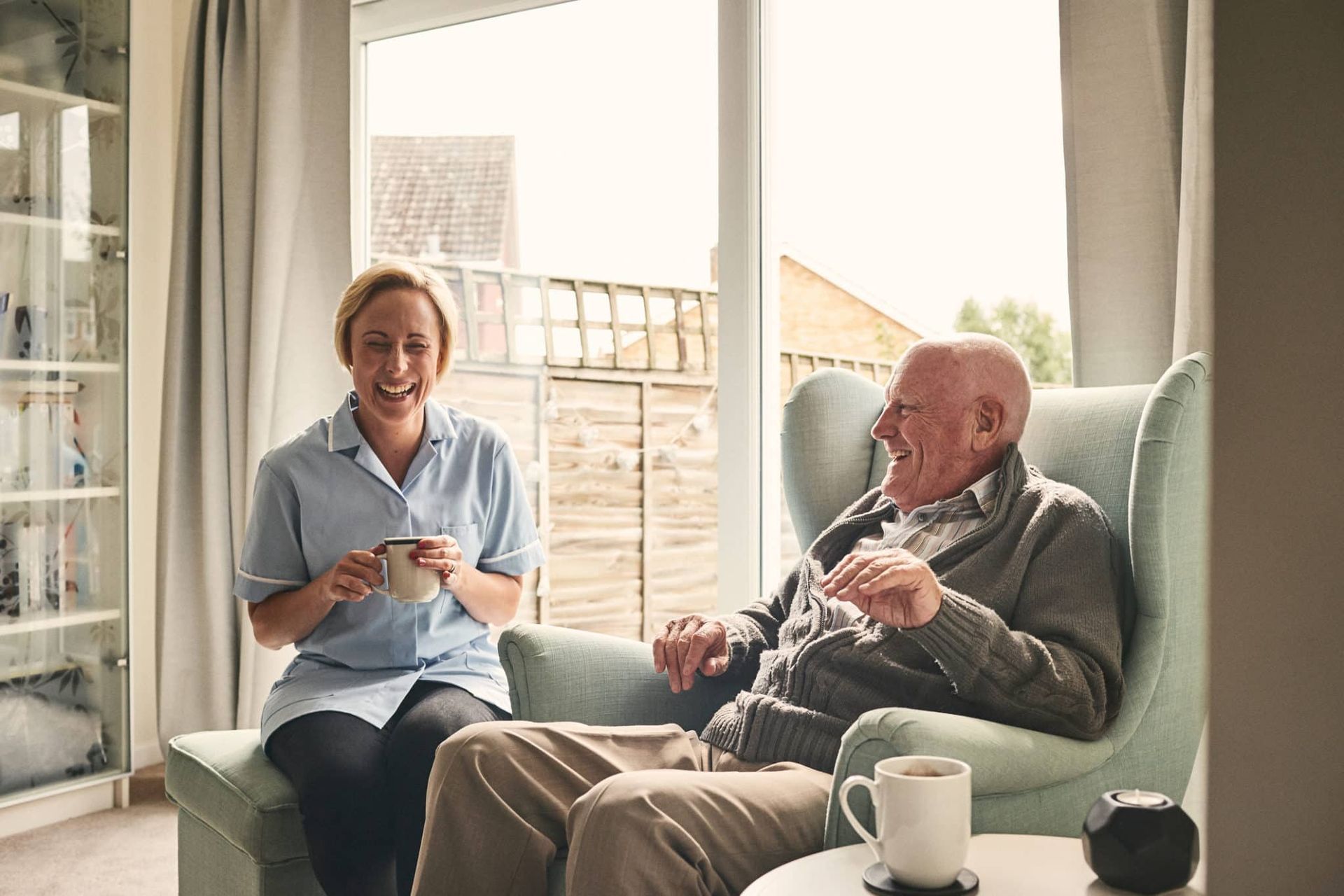Aging at Home: How Non-Medical Care Supports Independent Seniors
A Comprehensive Guide to Maintaining Independence with Compassionate In-Home Support

Introduction to Aging at Home
As the years pass, many seniors find themselves reflecting on where they feel most comfortable spending their later years. For most, the answer is simple: there is no place like home. The concept of aging at home resonates deeply with seniors and their families because it represents familiarity, comfort, and independence. Remaining at home allows older adults to stay connected to the spaces, memories, and routines that have shaped their lives. In a community like Boca Raton, where family bonds are strong and the environment is vibrant, the idea of aging gracefully in one’s own home holds even greater significance.
The desire to stay at home, however, often comes with challenges. Tasks that were once second nature can gradually become difficult. Simple things like preparing meals, keeping the house tidy, or running errands can start to feel overwhelming. Despite these obstacles, the preference for remaining at home remains steadfast for many seniors. The solution for countless families has become non-medical in-home care, a type of support designed to bridge the gap between total independence and the full-time care offered by assisted living or nursing facilities.
Non-medical home care focuses on assisting seniors with the activities of daily living without providing medical interventions. This form of care enables seniors to continue leading self-directed lives while receiving just enough help to manage daily tasks safely. It is a service that complements, rather than replaces, a senior’s independence. In-home caregivers become a trusted part of the household, offering support that preserves the senior’s dignity while enhancing their quality of life.
For families in Boca Raton and beyond, understanding how non-medical home care works and how it supports independent living is crucial. It allows them to make informed decisions that honor their loved one’s wishes. This guide explores the profound benefits of aging at home with the right kind of support, demonstrating how compassionate caregiving can make all the difference in allowing seniors to thrive within the comfort of their own homes.
The Emotional Value of Staying at Home
The emotional comfort that comes from aging at home is often underestimated, yet it plays an enormous role in a senior’s overall well-being. For many older adults, their home is more than just a building; it is the heart of their identity. It holds decades of memories, from raising children and celebrating milestones to simple daily routines that have become treasured rituals. The security of familiar surroundings fosters a sense of stability that cannot be easily replicated elsewhere.
When seniors are able to remain in their own homes, they retain a strong sense of control over their environment. This autonomy is crucial for mental health. Being able to decide what time to wake up, what to eat for breakfast, and how to spend the day reinforces a sense of purpose. Losing this control, as often happens when moving to institutional care settings, can lead to feelings of helplessness, depression, and a rapid decline in overall well-being.
The presence of familiar items, photos, furniture, and neighborhood connections contributes to emotional resilience. Seniors who remain at home often experience lower levels of stress and anxiety compared to those who transition to assisted living communities. The ability to continue living near friends, neighbors, and local landmarks provides a powerful sense of belonging that strengthens mental and emotional health.
Non-medical caregivers play a vital role in preserving this emotional security. By coming into the home to assist rather than uprooting the senior from their surroundings, caregivers support not just the physical needs of the individual but also their emotional stability. This balance allows seniors to maintain a lifestyle that feels both meaningful and secure, reinforcing the importance of aging in place as a deeply valuable choice.
How Non-Medical Care Enhances Independence
One of the most persistent misconceptions about in-home care is that accepting help means giving up independence. In truth, the right kind of support often has the opposite effect. Non-medical care is designed specifically to empower seniors to continue doing as much as possible on their own while receiving the assistance they need to stay safe and comfortable.
Seniors who receive help with daily tasks like housekeeping, meal preparation, or personal grooming often find that they have more energy and freedom to engage in the activities they enjoy. Instead of feeling worn down by the demands of managing a household, they are able to redirect that energy toward hobbies, socializing, and personal interests. This shift contributes significantly to a higher quality of life.
Moreover, the presence of a caregiver can greatly reduce the stress associated with tasks that have become physically challenging or even dangerous. For example, a senior who struggles with mobility may feel anxious about cooking over a hot stove or climbing onto a step stool to reach high shelves. With a caregiver present to assist, these tasks become manageable once again, allowing the senior to retain control over their lifestyle without unnecessary risks.
Caregivers also serve as companions, offering conversation and emotional support that further enhances independence. This companionship is especially important for seniors who live alone, as it helps combat feelings of loneliness and isolation. When seniors feel supported, they are more likely to maintain an active and engaged lifestyle, continuing to participate in community events, maintain friendships, and enjoy the routines that bring them joy.
Safety and Security Within the Home
Aging at home can present safety challenges that become more pronounced over time. Falls, medication mishaps, and household accidents are common concerns for seniors living alone. Families often worry about whether their loved ones are truly safe, especially if they live at a distance and cannot check in regularly. Non-medical caregivers help address these concerns by providing an extra layer of security.
Caregivers are trained to identify and mitigate potential hazards within the home. This might include ensuring walkways are clear of clutter, rugs are secured to prevent tripping, and frequently used items are placed within easy reach. Such simple adjustments can make a profound difference in reducing the risk of injury and maintaining a safe living environment.
Beyond the physical aspects of safety, caregivers also monitor for signs of health issues that may otherwise go unnoticed. Changes in behavior, sudden confusion, or a noticeable decline in mobility are all red flags that a caregiver can observe and report to family members promptly. This level of attention ensures that small issues are addressed before they escalate into larger problems.
The presence of a caregiver also means that help is readily available in case of an emergency. Whether it is calling for medical assistance, helping a senior after a fall, or managing an unexpected situation like a power outage, caregivers provide peace of mind. Families know that someone is there to respond quickly, which greatly reduces the anxiety that often accompanies having an aging loved one living alone.
Nutrition, Wellness, and Daily Living Support
Proper nutrition plays a critical role in the health and longevity of seniors, yet it is often one of the first areas to suffer when daily tasks become challenging. Shopping for groceries, planning meals, and cooking can become overwhelming for older adults, particularly those with mobility limitations or cognitive decline. As a result, many seniors fall into patterns of skipped meals, poor dietary choices, or reliance on processed foods.
Non-medical caregivers help restore healthy eating habits by assisting with meal planning, grocery shopping, and food preparation. They ensure that meals are not only nutritious but also tailored to the senior’s preferences and dietary needs. The simple act of sharing a meal or having help in the kitchen can make a tremendous difference in encouraging consistent, balanced nutrition.
In addition to supporting nutrition, caregivers assist with other aspects of wellness, such as encouraging hydration, helping with light exercise, and fostering daily routines that promote physical health. Maintaining regular schedules for meals, movement, and rest contributes to overall wellness and helps seniors maintain the energy needed to continue living independently.
Support with activities of daily living extends beyond food. Caregivers help with dressing, bathing, toileting, and grooming, all of which contribute to physical health and emotional dignity. When seniors feel clean, well-fed, and cared for, they are more likely to engage with their surroundings and maintain a positive outlook on life.
Combating Loneliness and Supporting Mental Health
One of the most profound yet often overlooked challenges of aging at home is the risk of social isolation. Seniors who live alone or have lost close friends and family members are particularly vulnerable to loneliness, which has been linked to a wide range of health problems including depression, cognitive decline, and even cardiovascular disease.
The presence of a caregiver offers essential companionship that can dramatically improve mental well-being. Simple daily conversations, shared activities like playing cards or going for a walk, and the consistent presence of another person provide emotional nourishment that is just as important as physical care. Caregivers often become trusted friends who help ease feelings of loneliness and provide a meaningful connection to the outside world.
For seniors who are no longer able to drive or who feel uncomfortable navigating public spaces alone, caregivers also provide transportation and accompaniment to social outings, appointments, or community events. This support allows seniors to continue participating in the social aspects of life that they enjoy, whether that means attending church, visiting friends, or engaging in hobby groups.
Beyond companionship, caregivers help create a sense of routine and stability, which is essential for mental health. Knowing that someone will visit at a certain time each day or week provides structure that reinforces a sense of security and belonging. This steady presence becomes a cornerstone of emotional resilience for many seniors aging at home.
Family Peace of Mind and Reduced Caregiver Burden
When a senior chooses to age at home, the responsibility of care often falls initially on family members. While family caregiving can be rewarding, it also brings with it significant stress, especially when combined with the demands of work, raising children, and managing one’s own household. Over time, this strain can lead to burnout, fatigue, and feelings of guilt or resentment.
Non-medical in-home care offers families the opportunity to share the responsibilities of caregiving in a way that is sustainable and healthy for everyone involved. With a professional caregiver handling daily tasks and providing consistent support, family members can step back from the role of full-time caregiver and return to being a supportive spouse, child, or sibling.
This shift improves the dynamics within the family, allowing visits to be focused on quality time rather than stress over chores or medical concerns. It also ensures that the senior receives expert care from someone who is trained to handle their unique needs, offering families peace of mind knowing their loved one is in good hands.
Additionally, the flexible nature of non-medical home care means that support can be tailored to the family’s specific needs. Whether it’s a few hours a week to provide respite for a family caregiver or full-time assistance, care plans are adaptable. This flexibility makes it easier for families to balance their own lives while ensuring their loved ones continue to receive compassionate, dignified support.
The Financial Practicality of Aging at Home
Many families assume that professional in-home care is unaffordable, but in reality, it can often be a more cost-effective solution compared to assisted living facilities or nursing homes. Because non-medical care is typically billed based on hours of service rather than a flat monthly fee, families have the flexibility to pay only for the support they actually need.
Seniors who do not require 24-hour medical care often find that a few hours of daily or weekly assistance is sufficient to maintain their independence. This targeted support is not only more affordable but also less disruptive than relocating to a care facility. The financial savings, combined with the emotional and psychological benefits of staying at home, make in-home care an attractive option for many families.
Furthermore, aging at home allows seniors to continue investing in their own lives and surroundings rather than paying for shared facilities and services they may not use in a communal setting. Families retain control over how funds are allocated and can adjust care plans as needs change over time, making it a flexible and sustainable solution for the long term.
Care agencies like Caring Solutions In Home Care work closely with families to create care plans that fit both their needs and their budgets. The focus is always on providing value-driven care that enhances the senior’s quality of life without compromising financial stability.
The Choice to Age at Home with Dignity
At its core, the decision to age at home with the support of non-medical care is about dignity, autonomy, and quality of life. It reflects the belief that seniors deserve to live on their own terms, surrounded by the people, places, and memories that matter most to them. With the right support system in place, the obstacles of aging become manageable rather than overwhelming.
Non-medical home care empowers seniors to maintain their independence while ensuring they receive the assistance necessary to navigate the challenges of aging. This approach preserves the freedom to continue enjoying hobbies, friendships, and the comforts of home, all while fostering safety, health, and emotional well-being.
For families, choosing in-home care represents an act of love and respect. It is a commitment to supporting a loved one’s desire to remain in the place they call home while ensuring that their needs are met with compassion and professionalism.
Caring Solutions In Home Care stands ready to support families through this journey. Our mission is to help seniors thrive in their homes, living each day with confidence, comfort, and dignity. Aging at home is more than a preference—it is a path to continued independence, fulfilled with care and compassion.







